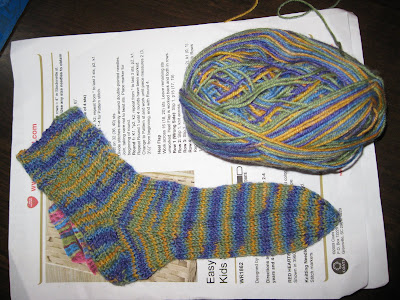More on Potty Accidents
Certainly it's possible for kids to be reliably potty trained by age 2 or 3, or even before age 1. Some kids are aware enough of their bodies to be able to know when they need to go to the bathroom and get themselves there by that age without being reminded, while others are not. Many kids are mature enough to do it by themselves sometimes, while still needing to be reminded at other times.
Ebee was able to take herself to the bathroom pretty reliably without reminding (as long as there wasn't too much extra excitement) by barely age 2, although she still occasionally had accidents. Now, by age 4, she almost never needs reminding and her accidents are pretty rare--maybe once a month to once every few months. Another of my kids is still occasionally going through phases of having frequent accidents (a few times a week to a few times a day) past beginning gradeschool age.
Many kids potty train very quickly, and others take much longer. Some kids just decide to potty train themselves one day, put on big kid underwear and never look back.
However, if your child doesn't take to it that quickly, or still needs regular reminding by the time they are preschool or kindergarten age, that can be normal. Being fully potty trained, having very few accidents or none at all for a few days, weeks or even months, and then regressing to having a lot of accidents again for a while is also very normal. Something as simple as a growth spurt or getting new clothes can trigger this.
According to most resources I've read, many if not most children will have accidents for 6 months or more after they are basically potty trained. Many resources suggest that if your child has been fully potty trained with no accidents for a year or more, and then suddenly starts having a lot of accidents, especially if this lasts for more than a few days, there might be an underlying problem. That would be something to look into further and discuss with the child's doctor, especially if there's not an obvious reason like a new baby in the family.
I've seen a statistic several different places that 15% of gradeschool-age children still have daytime potty accidents. If your child is still having what seems like an excessive number of accidents past about age 5, or has a regression or seems to be making backwards progress after age 4, it is probably something you'll want to least mention to the pediatrician. A 9 or 10 year old having accidents more frequently than a few times a year is definitely something I would be talking to her doctor about.
Stool accidents may be more of a concern after age 4 or 5 than the occasional urinary accident. But even older kids and adults can have incontinence from causes like severe diarrhea due to illness or too much fruit, of course. And you probably know that if your child ever experiences pain with urination, it's time to call the doctor.
Disorders such as interstitial cystitis, overactive bladder, or an unusually small bladder can be present even in children who are quite young, and if there is a physical issue that causes urinary or bowel incontinence you will want to figure that out sooner rather than later. Other less obvious factors such as ADHD, sensory integration issues or even giftedness can affect toilet training and the propensity to accidents, or can affect what methods work for teaching and motivation.
I'm not a doctor, so these are just my own thoughts based on my limited research, experience and talking with other parents. You know your own child best, and you are the best one to decide when it might be time to consult the doctor. It never hurts to mention a concern to the pediatrician when your child is in for a checkup, even if he or she is just going to assure you that your child is perfectly normal. :) Many medical offices or HMOs have advice nurses that can be consulted over the phone also.
A couple of things I forgot to mention that might help with a kid who is having accidents: Work with them to make sure they are emptying their bladder and bowels fully when they do go to the bathroom. Also, doing Kegel exercises can help them develop control. Boys can do Kegels too!
Another thing to look at is whether they are getting things like caffeine, lots of fruit juice, or other foods known to be diuretic in their diet.
I enjoyed this article on potty accidents, reminding the reader what it's like to be in the shoes of a young child, and some of the reasons accidents can happen. There are several reasons mentioned there that I didn't cover, but which seem to make a lot of sense.
Here's another article from the University of Michigan on toilet training resistance. I haven't experienced this issue enough to know how helpful the suggestions are, but if anyone reading has dealt with it feel free to add your suggestions in the comments.
Labels: learning, parenting, tips and techniques, toilet training






